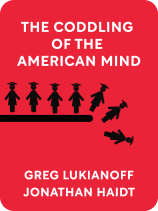

This article is an excerpt from the Shortform book guide to "The Coddling of the American Mind" by Greg Lukianoff and Jonathan Haidt. Shortform has the world's best summaries and analyses of books you should be reading.
Like this article? Sign up for a free trial here .
Are you looking for The Coddling of the American Mind quotes from Jonathan Haidt and Greg Lukianoff? What do these quotes say about the fragility of today’s youth?
In their book, Haidt and Lukianoff discuss the growing fragility amongst young people, specifically college students. The authors believe that colleges are preventing students from encountering controversial topics and stunting their emotional growth.
Keep reading for The Coddling of the American Mind quotes with analysis.
Quotes From The Coddling of the American Mind
Since the 2016 election, America has witnessed college campus protests against “controversial” or “dangerous” speakers. The Coddling of the American Mind explores this phenomenon, showing how a set of dangerous and false beliefs have taken root in the minds of today’s college students, convincing these young people that they are inherently fragile and must be protected from the allegedly harmful impacts of speech with which they disagree. This attitude threatens academic freedom, undermines democracy, and is ultimately harmful to the social and emotional development of today’s youth.
Below are five The Coddling of the American Mind quotes with explanations.
“A culture that allows the concept of “safety” to creep so far that it equates emotional discomfort with physical danger is a culture that encourages people to systematically protect one another from the very experiences embedded in daily life that they need in order to become strong and healthy.”
The mental health community used to have clear and objective standards for what constituted emotional “trauma.” Trauma was caused by emotionally shattering events that fell outside the bounds of normal human experience—things like rape, kidnapping, war, or torture. Events like the loss of a loved one or the end of a relationship, while certainly painful, would not qualify as traumatic.
In recent years, however, some parts of the therapeutic community have begun watering down the definition of trauma to include anything that the alleged sufferer claims is emotionally harmful. In other words, the definition of trauma has gradually become more subjective, defined exclusively by one’s personal experiences.
But emotional discomfort is simply not the same as trauma. The language of trauma has escaped the bounds of the psychiatric world and made its way into spaces where it formerly had no presence, namely college classrooms. At many colleges, students claim that mere exposure to certain classroom materials is traumatic and threatens their emotional and psychological well-being.
“Free speech and the ability to tolerate offense are the hallmarks of a free and open society.”
Despite the inherently antifragile nature of young people, the people and institutions that are most responsible for their healthy development—parents, teachers, schools, universities—have actively shielded them from any form of adversity. Most worrisome, this attitude has even spread to speech itself.
The idea has now taken root that offending speech is equivalent to physical violence. This is the logic of safetyism—the idea, increasingly accepted among students of Generation iGen (those born after 1995, discussed in greater detail shortly) that one’s emotional safety trumps all other moral concerns and trade-offs.
In this formulation, “safety” increasingly means being sheltered from opinions that you don’t agree with. Everyone is certainly entitled to physical safety and freedom from abuse—but you’re not entitled to safety from ideas.
“The notion that a university should protect all of its students from ideas that some of them find offensive is a repudiation of the legacy of Socrates, who described himself as the “gadfly” of the Athenian people. He thought it was his job to sting, to disturb, to question, and thereby to provoke his fellow Athenians to think through their current beliefs, and change the ones they could not defend.”
The corporatization of university life, the interests of university administrators, and the growing fragility and entitlement of today’s students all combine to create an atmosphere on campus that is highly threatening to academic freedom.
Because colleges increasingly fear being sued by students who claim to have been offended by something a student or professor said to them or by something they may have been assigned in class, administrators have promulgated onerous campus “speech codes” that define what ideas and modes of expression are and are not acceptable.
These codes are deeply damaging to free speech on campus and frequently lead to instances of overreaction to and overregulation of ideas. One professor at Oakton Community College who sent an innocuous email to fellow faculty members urging them to honor the struggle of workers on May Day was issued a cease-and-desist letter by the college. His offense? Merely referencing the violent 1886 Haymarket Square Riot in his email, which administrators believed constituted a veiled threat to the university president.
“Education should not be intended to make people comfortable; it is meant to make them think.”
The people and institutions that are most responsible for young people’s healthy development—parents, teachers, schools, universities—have actively shielded them from any form of adversity.
This is the ideology of safetyism—the idea that one’s freedom from emotional discomfort trumps all other moral concerns and trade-offs. In this formulation, “safety” increasingly means being sheltered from opinions that one doesn’t agree with.
“There are just two activities that are significantly correlated with depression and other suicide-related outcomes (such as considering suicide, making a plan, or making an actual attempt): electronic device use (such as a smartphone, tablet, or computer) and watching TV. On the other hand, there are five activities that have inverse relationships with depression (meaning that kids who spend more hours per week on these activities show lower rates of depression): sports and other forms of exercise, attending religious services, reading books and other print media, in-person social interactions, and doing homework.”
Schools should put greater emphasis on recess, with less adult supervision. While kids should always be kept safe, the definition of “safety” should be narrowed to mean only physical safety. School administrators should also strictly limit the use of devices on school property, as they have been shown to disrupt the learning process and increase anxiety and depression.

———End of Preview———
Like what you just read? Read the rest of the world's best book summary and analysis of Greg Lukianoff and Jonathan Haidt's "The Coddling of the American Mind" at Shortform .
Here's what you'll find in our full The Coddling of the American Mind summary :
- The "three Untruths" that have taken hold of young people
- The damage that "speech codes" cause on college campuses
- How colleges are increasingly seeing students as customers






